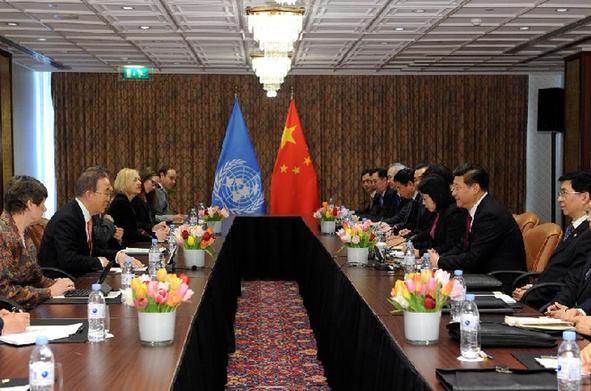Key areas of Xi Jinping's European tour
china.org.cn / chinagate.cn by Liu Zuokui, March 25, 2014 Adjust font size:
In recent years, China-Europe relations have witnessed steady development. The three pillars of China-Europe relations -- economic and trade exchanges, strategic dialogues and people-to-people exchanges -- have advanced significantly. From the schedule of President Xi's European tour we can tell that several major powers in Europe together with EU institutions are the focuses of China's Europe strategy, with economic and trade cooperation a priority.
|
Chinese President Xi Jinping (2nd R) meets with UN Secretary-General Ban Ki-moon (2nd L) in Noordwijk, the Netherlands, March 23, 2014. [Xinhua/Rao Aimin] |
Key areas for China-Europe cooperation
China and the EU officially launched negotiations of a comprehensive EU-China Investment Agreement on the occasion of the EU-China Summit held in Beijing on Nov. 12, 2013. However, as the EU side holds much higher expectations than China, it may be more difficult to achieve substantial progress here.
The EU hopes China will gradually abolish its restrictions on trade and foreign direct investment in the Chinese market. To this end, it has proposed a series of market access related conditions that are similar to those conditions prevailing in the free trade talks. Nevertheless, the main emphasis of China is that negotiations should be focused on the protection of investments, rather than expanding the market access areas.
During Xi's visit, the EU is bound to promote greater market access. To solve this problem, China has to make choices. On the one hand, the situation requires China to take care of the EU's core interests and concerns and expand the access of EU companies in the field of government procurement, financial services and telecommunications. On the other hand, China should also make sure its key industries are well protected. In terms of investment protection, the Chinese side hopes that the EU will further specify its norms and standards to better protect the interests of Chinese investors.



